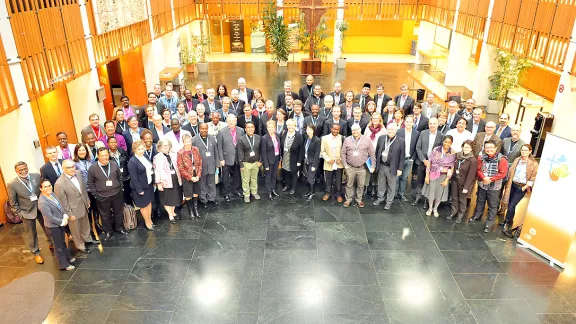
Participants in the Consultation on Contemporary Mission in Global Christianity. Photo: LWF/S. Gallay
LWF Global Consultation on Contemporary Mission in Global Christianity
(LWI) – As Lutheran churches approach the 500th Reformation anniversary in 2017, how do they understand mission in a holistic way, how is it carried out, where is it taught and what are some of the best practices in their fundamental goal to proclaim the gospel of Jesus Christ?
The Lutheran World Federation (LWF) has invited 80 mission practitioners to discuss some of these questions and other contemporary issues for the church today at a global gathering, 17-18 November, in Geneva. The Consultation on Contemporary Mission in Global Christianity will explore the current trends of mission on different continents, contemplate key challenges and map out a strategic approach for holistic mission at the LWF Twelfth Assembly in May 2017.
Participants include heads of mission agencies, LWF member church departments, and other bodies that support LWF’s work through the Department for Mission and Development (DMD).
DMD Director Rev. Dr Fidon Mwombeki points out that while discussion about holistic mission in the LWF is a continuous process that begun already in 1946, with several meetings at regional and global level since, its strategic approach needs to be reviewed critically in a communion of churches with quite diverse theological, historical and geographical contexts.
“We need this consensus building of minds to discern together our contemporary discovery of the gospel that liberated Martin Luther into Reformation nearly 500 years ago,” said Mwombeki, who will present a 70-year overview of LWF’s participation in and contribution to mission work at the consultation.
“We need this consensus building of minds to discern together our contemporary discovery of the gospel that liberated Martin Luther into Reformation nearly 500 years ago.”
“Most of the churches in all continents these days are taking mission more seriously than they did several years ago. What the church is, what happens when its numbers shrink or grow exponentially, how the Lutheran church takes advantage of modern communication possibilities, assumes its role in advocacy and so forth, are now issues even in countries where they were not before,” he added.
The consultation will open with eucharistic worship at the Ecumenical Center Chapel, during which LWF General Secretary Rev. Dr Martin Junge will preach, and clergy from among the participants will assist with other elements of the liturgy.
Keynote speaker Rev. Dr Rafael Malpica Padilla, director for Global Mission at the Evangelical Lutheran Church in America, will present the contemporary and ecumenical issues concerning global mission today. A participant from each of the seven LWF regions—Africa, Asia, Europe, Central Eastern Europe, Central Western Europe, Nordic Countries, Latin America and the Caribbean, and North America—will elaborate the main topics and challenges for churches there.
Group work will be based on topics suggested by participants. These include church planting and discipleship; diaconal service and development from a Lutheran perspective; advocacy as a strategic engagement of mission; charismatic movement in the Lutheran church; and theological training for mission, among others.
“In the midst of so many other issues today, discussion on what we mean by mission must be sustained, especially as we get to the threshold of the next 500 years of the Lutheran church,” Mwombeki concluded.


